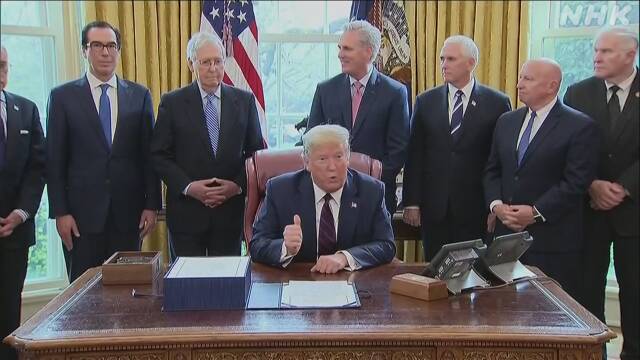New Corona US Emergency Economic Measures Achieved Total $ 2.2 trillion March 28 7:41
k10012355121_202003280738_202003280740.mp4
In response to the spread of the new coronavirus, an emergency economic measure in the United States was enacted on the 27th with a total value of $ 2.2 trillion and 230 trillion yen in Japanese yen. The Trump administration wants to stop the rapid economic downturn with unusually large fiscal measures.
The U.S. Emergency Economic Measures was signed and signed immediately by the Trump in the White House following the passage of a bill in the House of Representatives on the 27th.
According to President Trump, the scale of the measures totaled $ 2.2 trillion, or 237 trillion yen in Japanese yen, far exceeding the emergency measures in the event of the 2008 Lehman Shock.
"It's the biggest economic bailout in American history. It's an urgent need for workers, families and businesses," he said.
Specifically, ▽ In addition to providing cash of up to $ 1200 to individuals and 130,000 yen in Japanese yen, funding for companies such as airlines and hotels where management is deteriorating, and small and medium enterprises with reduced jobs are employees Includes measures to allow you to pay your salary.
At the request of the Opposition and Democratic parties, treatment for the unemployed has been expanded.
In the United States, the spread of the new coronavirus has limited the movement of people and goods, and the economy has rapidly deteriorated, with the number of unemployment insurance claims rising to a record-high of 3.28 million in the last week. In this measure, protecting the employment and livelihood of the people is put forward.
The economic measures were implemented 10 days after the government's announcement, but the challenge is to quickly implement benefits and support.
The main contents of emergency economic measures are
The implemented emergency economic measures are an unusually large scale, totaling $ 2.2 trillion, exceeding 230 trillion yen in Japanese yen.
Its main contents.
First, "cash payments" to support life. Up to $ 1200 per adult and $ 500 for children, depending on personal income.
A typical family of four with two children will receive $ 3,400, or about ¥ 350,000 in Japanese yen.
Next is the expansion of unemployment benefits. Increase allowances by $ 600 per week.
There are also new people called "gigworkers" who make a living on a one-off job, such as rideshare drivers who were not previously covered by unemployment benefits.
One of the pillars is a financial support framework for companies whose management has deteriorated due to the spread of the new coronavirus infection.
Of this amount, $ 350 billion or more than 37 trillion yen will be provided for small and medium-sized businesses to maintain employee employment and continue paying salaries.
For large companies, a total of $ 500 billion or 54 trillion yen will be allocated for government financing and debt guarantees.
The target is assumed to be mainly industries such as aviation and hotels where the number of passengers is sharply decreasing.
The Trump administration's performance has deteriorated after two aircraft crashes, suggesting support for aircraft giant Boeing, which is being overtaken by the new coronavirus.
Opposition and Democratic parties say that companies that have prioritized the value of stocks and shareholders only have been using large amounts of money to buy back their own shares from the market in support of major companies. It is strange that tax relief will be provided. "
For this reason, there are conditions for receiving government support, such as stock repurchases, stock dividends, and employment maintenance.
Regarding the timing of the measures, Treasury Secretary Mnuchin has forecast that cash payments to individuals will be able to begin approximately three weeks later.

